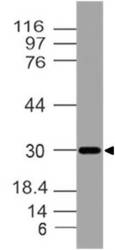Antibody data
- Antibody Data
- Antigen structure
- References [0]
- Comments [0]
- Validations
- Western blot [1]
Submit
Validation data
Reference
Comment
Report error
- Product number
- 10-1044-25 - Provider product page

- Provider
- ABEOMICS Inc.
- Product name
- Anti-Bi-1 Antibody
- Antibody type
- Monoclonal
- Description
- Bi-1 is an anti-apoptotic protein that inhibits Bax activation and its translocation to the mitochondria. Functionally, BI-1 affects the leakage of Ca2+ ions from the ER. In addition to its anti-apoptotic role, BI-1 also enhances cancer/tumor progression. It belongs to the Bcl-2 family, plays an important role in the mitochondrial apoptosis pathway. Bi-1 over-expression suppresses apoptosis induced by Bax, staurosporine and growth factor deprivation. BI-1 is presumably not needed for the physiological regulation of developmental programmed cell death. The anti-apoptotic mechanism of BI-1 involves the suppression of Bax activation and translocation to mitochondria, preserving the mitochondria membrane potential and mitochondrial morphology, and preventing the activation of post-mitochondrial caspases. BI-1 function is also associated with the regulation of intracellular Ca2+ omeostasis. In several human cancers, including nasopharyngeal carcinoma, its expression was found to be increased; however, up-regulated expression of this protein has been linked to increased cell proliferations.
- Reactivity
- Human
- Host
- Mouse
- Conjugate
- Unconjugated
- Antigen sequence
A partial length recombinant protei
n of human Bi-1 (amino acids 1-200)
was used as an immunogen for this
antibody.- Isotype
- IgG
- Antibody clone number
- ABM20E4
- Vial size
- 100 µg
- Concentration
- 0.5 mg/ml
- Storage
- Store the antibody at 4°C, stable for 6 months. For long-term storage, store at -20°C. Avoid repeat freez thawing
No comments: Submit comment
Supportive validation
- Submitted by
- ABEOMICS Inc. (provider)
- Main image

- Experimental details
- Expression analysis of Bi-1. Anti-Bi-1 antibody (Clone ABM20E4) was tested at 4 µg/ml on Jurkat lysate.
- Protocol
- Protocol
 Explore
Explore Validate
Validate Learn
Learn Western blot
Western blot